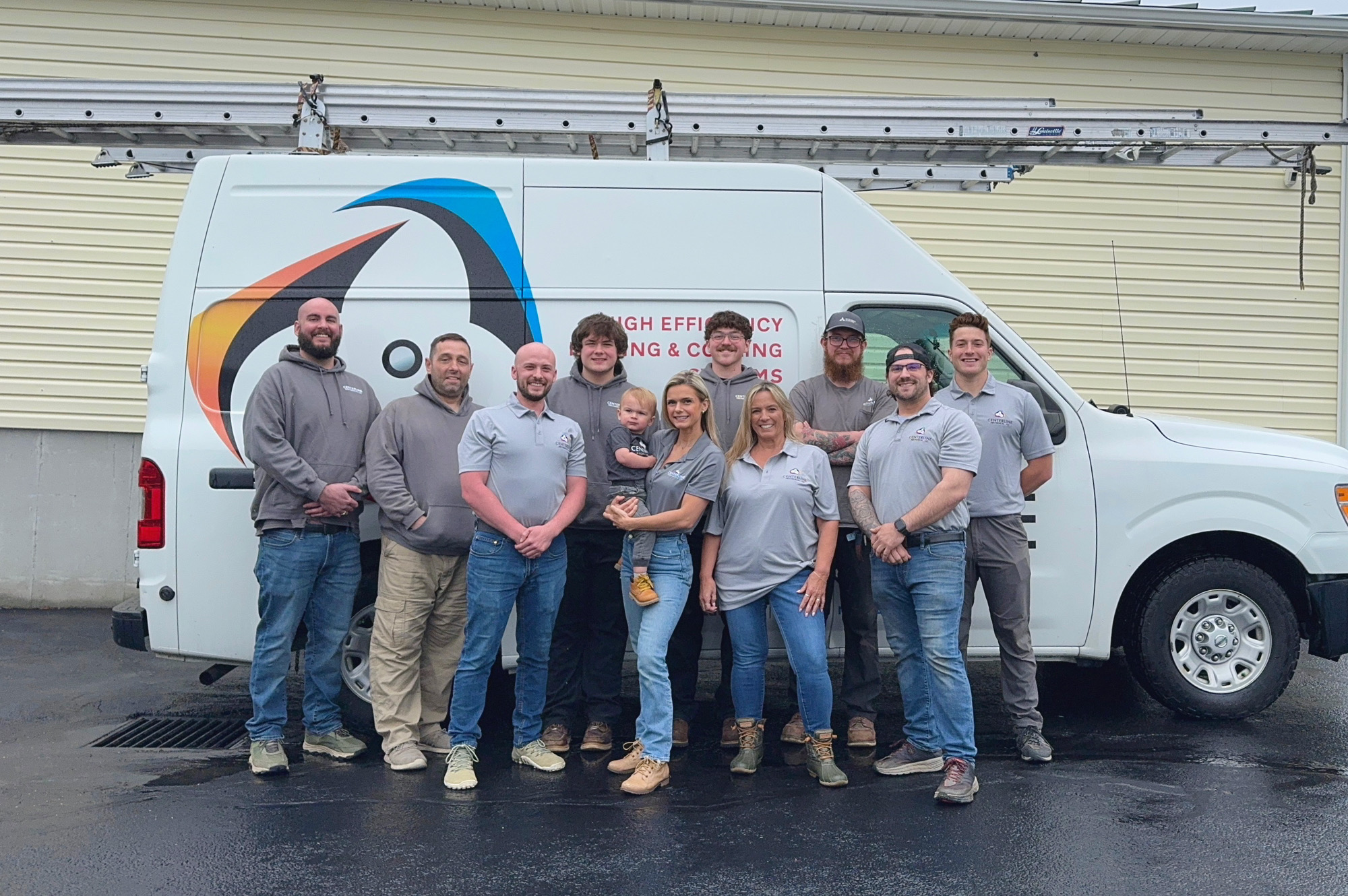Common Mini Split Problems in Hopedale Homes
Heating or cooling has dropped off
Low refrigerant is a common culprit. Sometimes from tiny leaks in the flare fittings outside or inside the home. Dirty indoor coils can also choke performance, and in multi-zone units, a stuck reversing valve can leave one room hot while another cools fine.
Water pooling under the unit
Most indoor leaks come from a blocked drain line or a drain pan that’s cracked or out of level. In older houses here, the wall sleeve isn’t always sealed tightly, letting humid air in and creating condensation.
Electrical shutdowns
Control boards, contactors, or blown fuses can take the whole system down. We test voltage at each stage, check wiring for heat damage or corrosion, and only replace components that fail those checks.
Noise, vibration, or weak airflow
If your system starts to whine, rattle, or thump, it’s usually a sign of fan imbalance, loose mounting, or worn bearings. We’ve seen this in Hopedale homes where the outdoor unit sits on older, uneven pads.
Mini Split Systems We Work On
Single-zone wall units
You’ll see these in converted attics, home offices, and bedrooms. They’re straightforward to maintain, but even small filter clogs can cut efficiency in half.
Multi-zone systems
One outdoor unit feeds several indoor heads. We often get calls when one head stops working—usually a sensor fault, refrigerant imbalance, or control misconfiguration.
Floor and ceiling cassettes
These are great for open-plan areas, but they’re out of sight, which means problems can go unnoticed until there’s water damage or reduced airflow. We open up panels, clean pans, and check the concealed filters.
Cold-climate heat pumps
These run year-round, even in the single digits. If the defrost cycle fails, they ice up quickly. We check sensors, board settings, and refrigerant to keep them heating steadily through January cold snaps.
How We Handle a Repair Call in Hopedale
- Listen and inspect: We start by hearing exactly what’s been happening—when you notice the problem, how often it occurs—then look over the filters, coils, drain lines, and electrical connections.
- Test it while it’s running: We switch the system into both heating and cooling and watch what it does in real time. That’s often when a problem shows itself—like a sensor that works fine until the coil gets cold, then quits.
- Pin down the problem: With the system running, we hook up our gauges, take temperature readings, and check electrical draw. Those numbers tell us if the refrigerant charge is off, if there’s a restriction, or if an electrical part is underperforming.
- Make the fix and dial it in: Once we know what’s wrong, we get it sorted. That could mean clearing a drain line, tightening and sealing a leaking flare fitting, swapping out a bad sensor, or adding refrigerant until the readings land where they should.
- Final check and cleanup: We measure the temperature split across the coil, confirm the airflow in each zone, and make sure all covers are back on securely. You get a straightforward rundown of what was fixed and what to keep an eye on.
Service Areas Around Hopedale
| Area | Notes |
| Hopedale | Homes near Hopedale Pond, Dutcher Street, and the Draper Field area |
| Milford | Capes, ranches, and colonials with ductless systems |
| Mendon | Drain clearing and refrigerant work for single and multi-zone units |
| Bellingham | Airflow and noise fixes in established neighborhoods |
| Uxbridge | Cold-climate heat pump service with winter performance checks |
If your town isn’t listed, call us—our service truck covers much of Worcester County.
Call (508) 310-0955
Discuss your project with our experts and receive a same-day estimate window, so you’ll know exactly what to expect before we begin.
Call Now
Preventing Repeat Mini Split Problems
Hopedale’s tree cover and seasonal pollen mean mini split filters clog faster than in many places. Cleaning them once a month during heavy use keeps airflow steady and strain off the fan motor.
Twice a year, we recommend flushing the drain line to prevent blockages—spring and fall are ideal.
For year-round reliability, book an annual check where we confirm refrigerant charge, test electrical components, and inspect the outdoor coil for debris or corrosion. That quick visit often saves you from a “no heat” call on a freezing January morning.
FAQs
Low refrigerant, clogged filters, blocked drains, bad sensors, and control board faults are most common in our area.
Usually it’s a blocked drain line or the unit isn’t level. Both are fixable, but the longer water runs inside, the more wall damage it can cause.
If your system is running but not reaching temperature, making new noises, leaking water, or showing an error code, it’s best to call before the issue worsens.
Yes—turn it off at the remote or breaker, wait three to five minutes, then restart. If the problem returns, it needs a proper repair.
Licensing and Compliance
Refrigeration Contractor License #11040. Electrical work is handled by a Massachusetts-licensed electrician when needed. Refrigerants are recovered and handled per federal rules.




